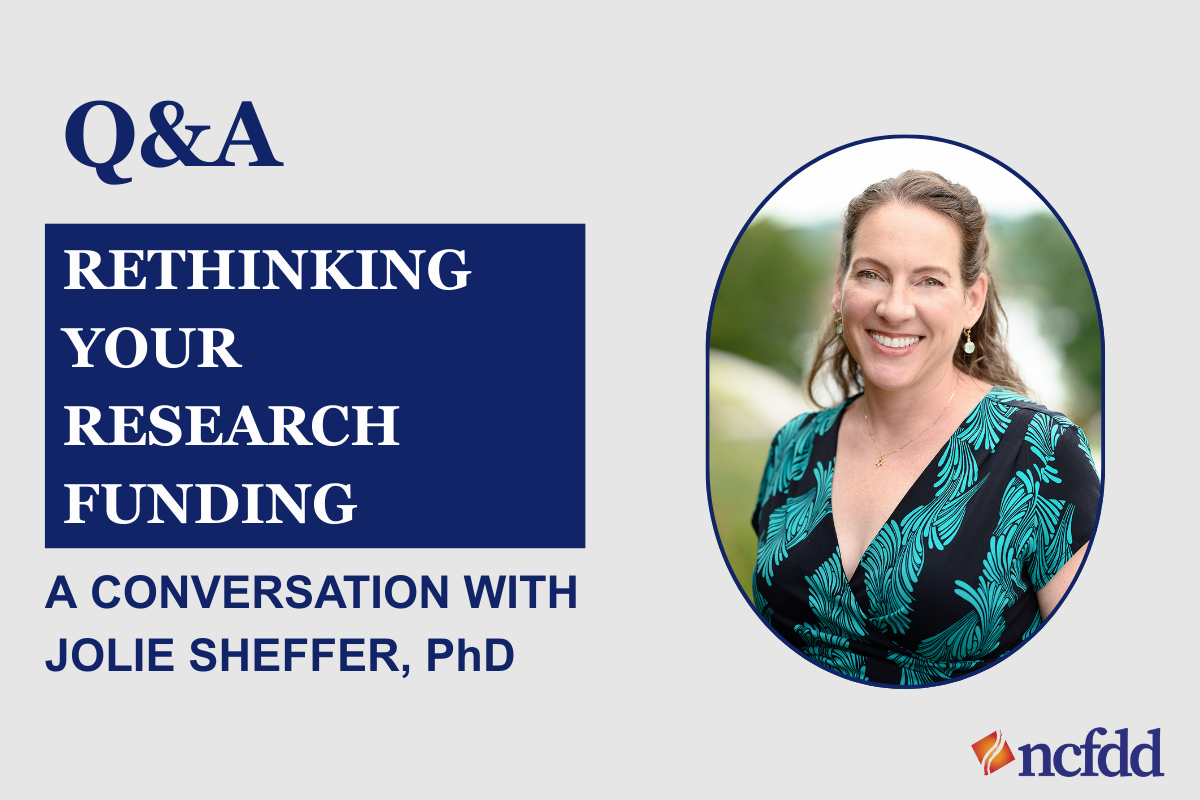Author: NCFDD
Ahead of the launch of our new Rethinking Your Research Funding course, we are spotlighting the experts who helped shape the curriculum. Jolie Sheffer, PhD is one of those experts, bringing deep experience as both a faculty member and an academic leader to the conversation.
As Associate Dean in the College of Arts & Sciences at Bowling Green State University, she supports faculty research, holistic mentorship, graduate studies, and experiential learning. Her own path has moved from earning tenure as a humanities professor to leading an interdisciplinary center, and now to a senior administrative role that blends leadership with continued scholarship. Along the way, her involvement with NCFDD as both a participant and a coach has shaped how she thinks about career design, funding opportunities, and the importance of aligning time with priorities.
In this Q&A, Jolie shares how key experiences shaped her approach to funding, lessons learned from working with faculty during times of change, and advice for navigating today’s competitive grant landscape.
Q: Can you walk us through one or two key grants or contracts that shaped how you approach funding today?
A: “I’ve been a part of a couple of National Endowment for the Humanities grants. Those have been the big ones for me, because I’m from a humanities discipline where grants are not the lingua franca, but those were my big introduction. More recently, I was a PI (Principal Investigator) on a large private foundation grant. We didn’t get it, but the process really taught me a lot about building relationships across campus and in the community.”
Q: Was there a turning point where something really clicked for you about alternative funding?
A: “A lot of my thinking came from my experience as a coach for NCFDD, especially during COVID and in the past year or so. Talking with faculty in real time—about grants being terminated, supporting staff on soft funding, and figuring out how to pivot—helped me understand the range of options out there. It was about strategizing together and making sense of what’s happening right now, what’s likely to stick, and what isn’t.”
Q: What do you know now that you wish you’d known earlier?
A: “Don’t assume that just because someone says something is true, it will remain so. When everyone around you is losing their heads, take a beat. Overreacting can waste energy—you can often stay the course while also making a backup plan. Also, don’t assume the only way to do your work is the way you’ve always done it. COVID forced us to teach differently, and while some changes were by necessity, others opened up new avenues we’re excited about.”
Q: From your perspective, what challenges are faculty facing most often when it comes to grant seeking, especially with alternative sources?
A: “The biggest one is that people just don’t know where to go to find them. Faculty who are grant-active know their agencies and have long-term relationships with program officers. But if you’re outside that world—or in a discipline without a strong grant culture—it can feel like there’s nothing out there for you. That’s not true. The key is knowing where and how to look for opportunities at whatever scale you need.”
Q: What do you think institutions sometimes overlook when trying to support faculty through the funding process?
A: “Some smaller or teaching-focused institutions think the grant world isn’t for them, when in fact there are big opportunities that fit their strengths. Larger institutions can make the mistake of focusing only on high-dollar grants. Supporting smaller projects helps faculty learn the genre of grant writing and builds a culture of seeking and sustaining external funding. There’s also a tendency to overlook state and local resources. Depending on your region, there can be strong funding priorities you wouldn’t expect. For example, here in the Midwest, water quality is a consistent investment area because agriculture is so important.”
Q: Is there still stigma around not receiving funding?
A: “Yes. We don’t talk about failure in the same way we talk about success. You won’t see someone post on LinkedIn that they applied for a $1.5 million grant and didn’t get it. But whether you receive funding or not, the process builds your network, improves your ability to tell the story of your research, and positions you for future success. We learn a lot from trying.”
Q: What excites you most about this new course?
A: “Helping faculty reimagine the possibilities and get out of the well-trod grooves they’ve set for themselves. Change is hard, but it can also open up new landscapes and opportunities. I also get excited about helping people in leadership roles think about the future and focus on what they can control. We often have more choice in how we spend our time and energy than we think.”
Learn How to Rethink Your Research Funding
In sharing her experiences, Jolie reminds us that research funding is as much about creativity and adaptability as it is about persistence. These are the same skills we will explore in depth in Rethinking Your Research Funding, a new four-week course designed to help faculty uncover opportunities beyond traditional federal grants.
With practical tools, expert guidance, and a supportive peer network, you will leave the course with a personalized funding plan and the confidence to put it into action.


